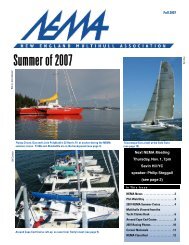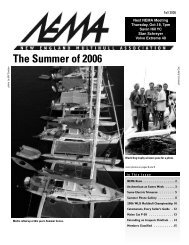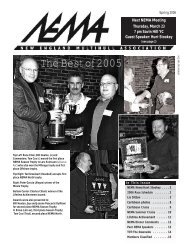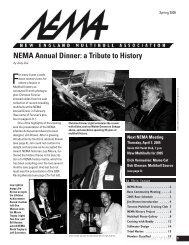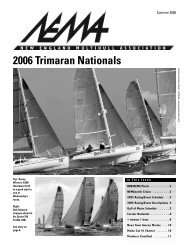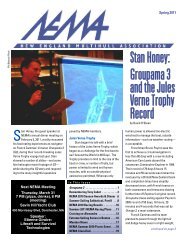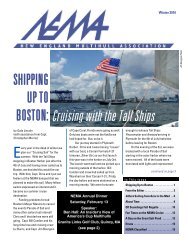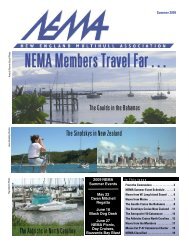Winter 2005 - New England Multihull Association
Winter 2005 - New England Multihull Association
Winter 2005 - New England Multihull Association
Create successful ePaper yourself
Turn your PDF publications into a flip-book with our unique Google optimized e-Paper software.
oat went over just like it was a beach<br />
cat. It went over very easily and it took<br />
me very much by surprise. Looking back<br />
on it, if we hadn’t trimmed the spinnaker<br />
so tight, if we’d been able to ease it<br />
quicker–but it was on a self-tailer and I<br />
told them to trim it. If someone was holding<br />
the spinnaker sheet in their hand<br />
they could have eased it. It went over<br />
very fast–the boat didn’t stop, or stall. It<br />
was one complete motion–the boat went<br />
in, then straight up. I grabbed the traveler<br />
line, then I was hanging, then I was in<br />
the water up to my chest, then I jumped<br />
up on the trampoline. One crew member,<br />
Duane [Zelinski, the owner] was in the<br />
cockpit and went down below. Two guys<br />
were out on the net, one on the main,<br />
one on the spinnaker. The fifth man,<br />
Louie, was forward and he actually had a<br />
self-inflating life jacket on and he got<br />
stuck momentarily–he was pinned under<br />
a small forward lacing under the boat but<br />
he was able to get out. I saw everybody<br />
was accounted for. No one got hurt;<br />
there was little damage to the boat. We<br />
did not break the mast or anything.<br />
Ted Grossbart (TG): Rosebud II is a<br />
formula 28, a scaled<br />
down formula 40 with<br />
a bigger rig–an<br />
extreme boat and we<br />
had added racks to<br />
the boat so it was at<br />
that point 28 feet long<br />
and 34 feet wide.<br />
This was in the<br />
Ted Grossbart<br />
Gloucester Schooner<br />
Race [September 1, 2001], gusty, with<br />
sharp lulls, up and down. We had been<br />
sailing fine, letting stuff out in the gusts,<br />
and pulling in in the lulls during the first<br />
part of the race. It was an offshore<br />
breeze and close to the shore you get a<br />
lot of funneling. We were on a close<br />
hauled to close reach course and got hit<br />
by a puff that was much bigger than we<br />
had before. There’s some question as to<br />
whether the jib sheet jammed, but I don’t<br />
really think that was the issue. We went<br />
over at 45 degrees, the bow went in, the<br />
boat went up, and started to come back<br />
[up]–we thought we were all right. Then<br />
we got hit by another gust and quite<br />
slowly [we went over]. We’d been doing<br />
about 28 plus. Once you’ve gone over on<br />
the side you’re way up in the air, two or<br />
three stories up looking for a landing<br />
place. Most of the crew was out on the<br />
rack which hinged with some slingshot<br />
action, so they went in first. It was really<br />
a sort of best case situation with no real<br />
injuries, just black and blue marks, and<br />
no serious damage–we were sailing a<br />
week later. [We were] right along the<br />
shore, the harbormaster and Coast<br />
Guard were there.<br />
The Coast Guard at first didn’t want<br />
to help, then the harbormaster came<br />
over, took a line and got us almost all the<br />
way over but they didn’t have enough<br />
horsepower. We also didn’t have a bridle<br />
rigged. Once the Coast Guard saw it<br />
was going to work they wanted to join<br />
in. They flipped us back over and had a<br />
pump, then took us back into Gloucester.<br />
The obvious lesson is we had too much<br />
sail area up. It’s an extreme boat, we<br />
knew we were on the edge, we were<br />
thinking capsize, and we got caught.<br />
Ira Heller (IH): Syd and I were sailing<br />
in the NOOD Regatta in 1995 [in<br />
Mothra, an F27 trimaran]. The race was<br />
being held in upper Narragansett Bay<br />
near Gould Island. There had been a hurricane<br />
that passed south of the Atlantic<br />
coast with large rollers coming into the<br />
bay. It was blowing out of the north at<br />
about 25 knots with the wind against the<br />
waves. It was a windward/leeward<br />
course and we were sailing with a symmetric<br />
spinnaker. I found it difficult to<br />
jibe. We decided the best course of<br />
action before we passed the mark was<br />
to take it down and handed the spinnaker<br />
sheet to a monohull sailor [with little<br />
multihull experience]. We stuffed the<br />
bows into a wave doing 15 knots and the<br />
boat slowed down, the stern started to<br />
come up, we got hit by another gust and<br />
the fellow holding the spinnaker used it<br />
as a brace to hold himself instead of<br />
releasing it, so it continued to pull the<br />
boat over the bows. I held onto the tiller<br />
to hold myself from sliding into anything.<br />
I found myself in the water–I ended up<br />
underneath the boat. I realized I was in a<br />
dangerous situation, and I was hoping I<br />
was choosing the right direction to<br />
swim–it’s very disorienting There’s limited<br />
visibility in the<br />
water–maybe 6<br />
feet. I had the<br />
presence of mind<br />
to grab a breath of<br />
air before I hit the<br />
water. I didn’t<br />
know where anyone<br />
else was until<br />
after the capsize. Ira Heller<br />
Sydney Miller (SM): At the time we<br />
were glad we weren’t wearing our autoinflating<br />
life jackets,<br />
and we were glad we<br />
weren’t tethered to<br />
the boat. I was on the<br />
net getting ready to<br />
take down the spinnaker<br />
and I remember<br />
thinking I wish there<br />
was another way to<br />
Sydney Miller take the spinnaker<br />
down. I thought I would be counting<br />
heads, and hoping I was not going to<br />
have to go diving looking for anyone. I<br />
was very aware that when the boat<br />
came over there were going to be lines<br />
everywhere. In most cases we have all<br />
been incredibly lucky that up to this point<br />
no one has been entangled. It was largely<br />
luck. I was glad it was daylight, and I<br />
was glad that we were racing and there<br />
were other boats around. It was an<br />
unfortunate combination of wind and<br />
waves, but it was also user error.<br />
Joe Colpitt (JC): I was asked to help<br />
the owner of a 49 foot lightweight cruising<br />
tri [sail] from Martha’s Vineyard to<br />
the Virgin Islands in November, 1981. We<br />
left the second week of November. After<br />
a day or so I heard on the radio that a<br />
hurricane was south of Cuba. It turned<br />
into an extra-tropical cyclone and swept<br />
north at us at 30 knots; it caught us about<br />
200 miles north of Bermuda.<br />
We beat into it going south for quite<br />
a while, then turned around and started<br />
to run before it with the storm jib. We<br />
didn’t have a drogue or a sea anchor. It<br />
kept building and around 9:00 at night,<br />
we plowed into the huge waves right up<br />
to the main beam, all three hulls, then<br />
they would pop up, and we would plow<br />
in again. I kept jibing the storm jib accicontinued<br />
on next page<br />
<strong>Winter</strong> <strong>2005</strong> N E M A<br />
5



